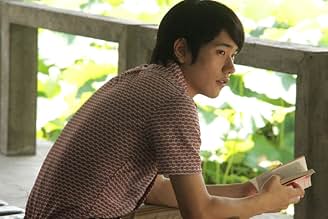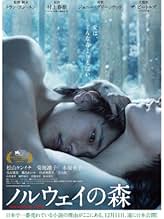Toru recuerda su vida en la década de los sesenta cuando, tras el suicidio de su amigo Kizuki, se acercó a Naoko, la novia de Kizuki, y a otra mujer, la extrovertida y enérgica Midori.Toru recuerda su vida en la década de los sesenta cuando, tras el suicidio de su amigo Kizuki, se acercó a Naoko, la novia de Kizuki, y a otra mujer, la extrovertida y enérgica Midori.Toru recuerda su vida en la década de los sesenta cuando, tras el suicidio de su amigo Kizuki, se acercó a Naoko, la novia de Kizuki, y a otra mujer, la extrovertida y enérgica Midori.
- Dirección
- Guionistas
- Elenco
- Premios
- 4 premios ganados y 9 nominaciones en total
- Student Activist
- (as Kohei Yoshino)
- Dirección
- Guionistas
- Todo el elenco y el equipo
- Producción, taquilla y más en IMDbPro
Opiniones destacadas
All that remains now is nostalgia.
And that is why, critically acclaimed Japanese writer Haruki Murakami's novels spoke to so many people. His works poignantly captures the spiritual emptiness of the modern generation and explores the loss of human connection in the bustling society we live in today. And just when detractors thought that Murakami's bestselling 1987 novel was un-filmable, along comes Tran Anh Hung, whose past works include the award winning Cyclo (1995) and The Scent of Green Papaya (1993).
Set in Tokyo during the late 1960s, the film's male protagonist is Toru, a quiet and serious college student. He loses his best friend to suicide, and his personal life is thrown into turmoil. He becomes emotionally closer to his friend's ex-girlfriend Naoko, who shares the same sense of loss. Circumstances bring Naoko to a sanatorium, and Toru becomes devastated. Another girl, Midori, enters his life, and he realises that she is everything Naoko isn't. Torn between two women and feeling empty about life's past and future, what ensues is Toru's nostalgic journey of loss and sexuality.
The above synopsis probably doesn't do justice to Murakami's writing, which is known to be humorous and surrealistic. While we haven't read the original novel which this 133 minute film is based on, we have chanced upon Murakami's other works, and we must recognize Tran's decision to adapt the story into a feature film.
The first thing which grabs you is the hypnotically mesmerizing cinematography by the award winning Lee Ping Bin (In the Mood For Love, Three Times). The breathtaking mountainous landscapes of Japan are captured on Lee's lenses like gems. You can imagine yourself wandering through the green grasslands and the snowy grounds, letting the spectacle engulf your senses. To replicate the mood of 1960s, production designers Norifumi Ataka and Yen Khe Luguem have painstakingly created scene after scene of the film's characters journeying through life's alleys against backdrops of intricately decorated cafes, workshops and hostel rooms. The result is a visually pleasing mood piece which displays the director's eye for details. The soundtrack composed by Radiohead guitarist Jonny Greenwood completes the viewing experience with an enigmatic score.
Also commendable are the cast's performances. Playing Toru is Kenichi Matsuyama (Death Note's "L"). He has an empathetic vulnerability which leaves a lasting impression with viewers. Rinko Kichuki (Babel) displays the much needed frailty of Naoko's character without becoming overly melodramatic, while newcomer Kiko Mizuhara is charming as the charismatic Midori.
Like most literary adaptation, this film loses some of the novel's poignancy when it comes to character and plot development. Emotions are conveyed through convenient voiceovers, and the exploration of sexuality may appear preposterous to those who uninitiated to Murakami's works. Furthermore, the slow and meandering pacing of the two odd hour film may be a test of patience to some.
It will take audiences who are familiar with the postmodern writer's work to appreciate this film. If you are an individual who often indulges in poetic wistfulness, this may just be the perfect film for you on a contemplative evening too.
- www.moviexclusive.com
Both book and film are very Japanese. So be prepared for a slow pace, allowing you plenty of time to catch up with its story. Be prepared for a Japanese styling as well. The film also follows the book's plot, more precisely than we are used to in our Western world.
Nou doubt the film 'Norwegian wood' peaks with its acting. Here we talk true Japanese high quality. The unfortunate contrast is made by its disappointing picturing. One can only guess if this is due to a lack of money, or to the desire to apply to 1969-shooting methods.
All in all 'Norwegian wood' is an enjoyable & well made film, allowing you a pleasant evening in the cinema. Those around in 1969 will get themselves carried back to their young days.
The cinematography of Norwegian Wood is excellent. So if you are big on cinematography, then this would be a good film to watch. Otherwise? Not so sure... I myself find the character of Watanabe very unappealing, and his appeal to Japanese women rather baffling, but maybe that's just a cultural difference.
The film is good - very good. Just not the great film I'd hoped it would be. There are wonderful scenes and great acting, and the cinematography is beautiful. But I think there are some major flaws. The flow of the film is oddly disjointed at times - while the book is very much written from the perspective of an older, wiser man looking back at his immature youth, the film seems unsure of its own perspective. The voice-over is poorly structured, seemingly aimed at filling in narrative gaps rather than giving us the older narrators overview. Oddly for Tran, a director who has been extremely minimalist in the past, some scenes are far too overwrought, not helped by the intrusive and anachronistic score. The casting is also uneven - Rinko Kikuchi is a marvelous actress, but is simply too old to play a convincing 20 year old. The character of Reiko is also played by an actress much younger than the character in the book, but the part hasn't been changed accordingly. That said, Kenichi Matsuyama as Toru and in particular Kiko Mizuhara as Midori are terrific.
I really don't know how someone who doesn't know the book will react to this. I suspect that if you are a romantic at heart, you will like it, even if you find it a bit overlong and some of the characters too thinly drawn. Fans of the book will mostly love it as it is quite faithful (maybe too faithful) to the story.
The novel "Norwegian Wood" depicts the university days of the main character, Watanabe Tohru. In the novel, he lives in Tokyo, and goes to university. He likes reading American modern literature. He did not have any friends except for one best friend during his high school days, but the friend killed himself at the age of seventeen. Watanabe has several relationships with women between the age of 18 and 21. Some characters in the novel, other than Watanabe's best friend, have also killed themselves. The novel consists of sex, death, literature, and intelligence.
I went to university, and had some close female friends. In addition, I liked reading classic literature. Furthermore, I did not belong to a sport clubs at university, so the scope of my friendship was limited. In essence, I felt a sense of intimacy with Watanabe while reading the novel. (In fact, I learnt "The Catcher in the Rye" by J. D. Salinger and "The Great Gatsby" by F. Scott Fitzgerald from Norwegian Wood, and both books were the first English novels which I completed reading in their original language.) Norwegian Wood is an important book for me, so I was glad to hear, 2 to 3 years ago, that the movie version of this novel would be screened. The movie was released about one week ago, and I went to see it today.
Locations shot in the movie were beautiful, and the music sounds good. In particular, I was moved by one scene in which Reiko sang "Norwegian Wood" by the Beatles with a guitar, and Naoko lost her mental stability during Reiko's performance. In addition, the cast members in the movie were also good, especially Mizuhara Kiko, who played Midori, was very cute and vivid.
Since I have read the novel over and over, and remember the whole story in detail, I can go so far as to say that I do not need any explanation for the story in the movie. Because I know the story, I was purely interested in how the film director, Tran Anh Hung, had expressed the novel through the media of a movie.
The movie version of "Norwegian Wood" was not solely a converted version of the novel, but represented its originality and creativity with the help of movie techniques, such as music, voice (cry, laugh, or angry), facial expression, and scenery.
However, it is certain that those who have never read the novel will not enjoy the movie.
(The above comment is forwarded from my blog at http://metropolitantokyo.blogspot.com/)
¿Sabías que…?
- TriviaThis is only Jonny Greenwood's second film score, following his acclaimed work on Petróleo sangriento (2007). Greenwood was keen to score the film as he was a big fan of the novel. His involvement was in some doubt, however, as Thom Yorke wanted to return to the studios to record a new Radiohead album. Greenwood found the time to balance both projects.
- Citas
Toru Watanabe: Nothing can heal the loss of a beloved. No truth, no sincerity, no strength, no kindness can heal that sorrow. All we can do is live through the sorrow and learn something from it. But whatever we learn will be of no help in facing the next sorrow that comes along.
- Versiones alternativasThe German TV version is 10 min shorter.
- ConexionesFeatured in At the Movies: Venice Film Festival 2010 (2010)
Selecciones populares
- How long is Norwegian Wood?Con tecnología de Alexa
Detalles
- Fecha de lanzamiento
- País de origen
- Sitios oficiales
- Idioma
- También se conoce como
- Norwegian Wood
- Locaciones de filmación
- Productoras
- Ver más créditos de la compañía en IMDbPro
Taquilla
- Total en EE. UU. y Canadá
- USD 13,000
- Fin de semana de estreno en EE. UU. y Canadá
- USD 13,000
- 8 ene 2012
- Total a nivel mundial
- USD 19,144,719
- Tiempo de ejecución2 horas 13 minutos
- Color
- Mezcla de sonido
- Relación de aspecto
- 2.35 : 1
Contribuir a esta página



























